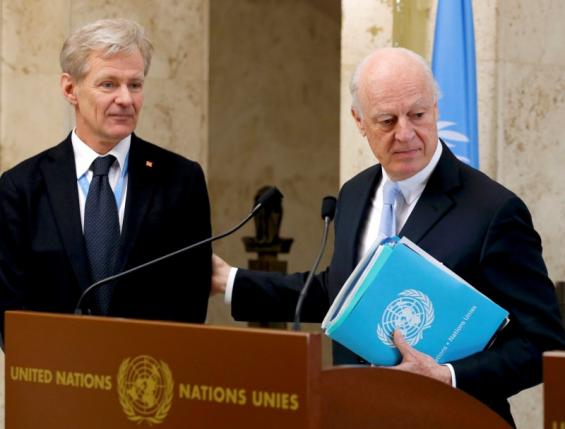
Staffan de Mistura (R) United Nations Special Envoy for Syria arrives with his special advisor Jan Egeland for a news conference after a meeting of the Task Force for Humanitarian Access at the U.N. in Geneva, Switzerland, March 4, 2016. REUTERS/Denis Balibouse
The United Nations Syria envoy Staffan de Mistura said in an interview with pan-Arab newspaper Al Hayat that he expected a staggered start to peace talks next week, with participants arriving over several days for “indirect meetings”.
“I see us beginning on March 10 when we will launch the process,” said envoy Staffan de Mistura. “Some (participants) will arrive on the ninth. Others, because of difficulties with hotel reservations, will arrive on the 11th. Others will arrive on the 14th.”
The talks will be conducted indirectly, not face-to-face.
“We will hold preparatory meetings and then go into detail with each group separately,” he said.
De Mistura tried to convene peace talks in January, but these collapsed before they had even started seriously. The five-year Syrian civil war has killed more than a quarter of a million people and urged thousands to flee the violence, thus creating a massive refugee crisis for Lebanon, Turkey and the European Union.
The new effort to conduct the talks follows the implementation of a partial truce a week ago. The “cessation of hostilities” agreement was drawn up by Russia and the United States and it excluded operations against ISIS and al-Nusra Front.
Yet, fighting has continued in many parts of Syria and both the Syrian government and the opposition reported violations.
The reduction in violence has made aid deliveries easier in some areas of the country, but de Mistura said the Syrian government should be processing aid faster.
“Lorries are waiting for 36 hours,” he said. “And medical aid must be allowed.”
The World Health Organization said on Wednesday that Syrian officials had rejected the delivery of medical supplies, including trauma and burn kits and antibiotics, in a convoy to the besieged town of Moadamiya two days earlier.
De Mistura said he plans to invite members of the government, the opposition, civil society and women to the peace talks.
“Women are important to us because they have a lot to tell us about the future of Syria. We will meet with them separately,” he said.
